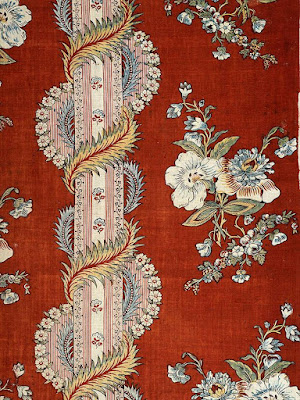 |
| Italian Makers Fabric Panel ca. 1450-1500 silk velvet with gilt-metal threads Art Institute of Chicago |
 |
| Italian Makers Fabric Panel ca. 1480-90 silk velvet with gilt-metal threads Bayerisches Nationalmuseum, Munich |
 |
| Italian Makers Fabric Panel 17th century silk damask Isabella Stewart Gardner Museum, Boston |
 |
| French Makers Fabric Panel ca. 1750 silk brocade Art Institute of Chicago |
 |
| French Makers Fabric Panel ca. 1770-80 silk brocade Royal Ontario Museum, Toronto |
 |
| French Makers Fabric Panel ca. 1780-90 block-printed and hand-painted cotton Royal Ontario Museum, Toronto |
-c1650-70-wool-and-silk-tapestry-work-Denver-Art-Museum.png) |
| Netherlandish Makers Fragment of Table Carpet ca. 1650-70 wool and silk tapestry-work Denver Art Museum |
 |
| Charles Francis Annesley Voysey (designer) Fabric Panel ca. 1890 printed cotton-and-silk blend National Gallery of Australia, Canberra |
 |
| Constance Irving for William Foxton Ltd. Fabric Panel ca. 1925-30 roller-printed cretonne private collection |
 |
| Russian Makers Fabric Panel - "Construction Site" ca. 1920-30 machine-printed cotton private collection |
-Royal-Ontario-Museum-Toronto.jpg) |
| House of Scalamandré Fabric Panel "Ancient Horses frightened by Voice of the Oracle" 1949 screenprinted cotton Royal Ontario Museum, Toronto |
-c1890-1900-roller-printed-cotton-Denver-Art-Museum.png) |
| American Makers Fabric Panel - "Tumbling Blocks" Patchwork Pattern ca. 1890-1900 roller-printed cotton Denver Art Museum |
-c1960-screenprinted-cotton-A-National-Gallery-of-Australia-Canberra.jpg) |
| Helen Grey-Smith (designer) Fabric Panel ca. 1960 screenprinted cotton National Gallery of Australia, Canberra |
-c1960-screenprinted-cotton-B-National-Gallery-of-Australia-Canberra.jpg) |
| Helen Grey-Smith (designer) Fabric Panel ca. 1960 screenprinted cotton National Gallery of Australia, Canberra |
 |
| Unknown Maker Fabric Panel (Bauhaus Study Sample of Furnishing Fabric) ca. 1926 wool, cotton, rayon National Gallery of Australia, Canberra |
 |
| Lena Bergner (weaver) Fabric Panel (Bauhaus Study Sample of Dress Fabric) ca. 1930 cotton National Gallery of Australia, Canberra |
Penelope's Song
Little soul, little perpetually undressed one,
do now as I bid you, climb
the shelf-like branches of the spruce tree,
wait at the top, attentive, like
a sentry or look-out. He will be home soon,
it behooves you to be
generous. You have not been completely
perfect either; with your troublesome body
you have done things you shouldn't
discuss in poems. Therefore
call out to him over the open water, over the bright water
with your dark song, with your grasping
unnatural song – passionate,
like Maria Callas. Who
wouldn't want you? Whose most demonic appetite
could you possibly fail to answer? Soon
he will return from wherever he goes in the meantime,
suntanned from his time away, wanting
his grilled chicken. Ah, you must greet him,
you must shake the boughs of the tree
to get his attention,
but carefully, carefully, lest
his beautiful face be marred
by too many falling needles.
– Louise Glück (1996)